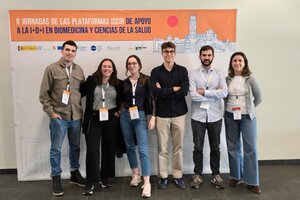SJD Barcelona Children's Hospital and Institut de Recerca Sant Joan de Déu (IRSJD) consolidate their participation in the ISCiii Biomedicine and Health platforms
Members of the innovation team from the SJD Barcelona Children's Hospital and the Institut de Recerca Sant Joan de Déu (IRSJD) participated in the II Scientific Conferences promoted by the Instituto de Salud Carlos III (ISCiii), held in Lleida from October 28 to 30.
For the second consecutive year, this collaborative and discussion space brought together professionals from the entities that form part of the three Support Platforms for R&D&I in Biomedicine and Health Sciences to address key topics such as advanced therapies, artificial intelligence, the European Health Data Space regulation, and innovation specialisation, with the aim of promoting the transfer of knowledge to the market.
The Biomedicine and Health platforms
These platforms, in which the SJD Barcelona Children's Hospital and Institut de Recerca Sant Joan de Déu (IRSJD) have renewed their recognition and participation for the period 2024-2026, comprise infrastructures and professionals from various institutions with the capacity to provide transversal support services to the R&D&I system for the generation and transfer of high-quality knowledge in the National Health System. They include ITEMAS (Platform for the Promotion and Innovation of Industrial Capabilities in the National Health System and their effective transfer to the productive sector), SCReN (Spanish Clinical Research Network), and PISCIIIBB (Platform of Biomodels and Biobanks).
Their priority is to consolidate a competitive research and innovation system that works cooperatively and synergistically, ensuring the rapid transfer of knowledge to benefit patients and society through the integration of infrastructures and professionals from various institutions with the capacity to provide transversal support services for knowledge generation and transfer within the National Health System.
SJD Barcelona Children's Hospital leads pediatric innovation
In the case of the ITEMAS Platform, coordinated by the Parc Taulí Research and Innovation Institute (I3PT), the Innovation Department of SJD Barcelona Children's Hospital leads one of the 26 units participating in the impact program designed to accelerate the industrialisation and adoption of innovations emerging from National Health System centres in the fields of paediatrics and rare diseases.
This unit includes two associated entities, the Canary Islands Health Research Institute Foundation (FIISC) and the Niño Jesús Children's University Hospital in Madrid, with whom it will actively collaborate to accelerate innovation in health technologies and boost research and result transfer in the diagnosis and treatment of rare pediatric diseases. Furthermore, in collaboration with the I3PT Research and Innovation Institute of Parc Taulí Hospital, it will coordinate the platform's Internationalization Committee.
Promoting clinical research in rare diseases
The Clinical Trials Unit of the Institut de Recerca Sant Joan de Déu (IRSJD) is part of the SCReN Platform, which aims to support independent clinical research on medicines, advanced therapies, medical devices, health products, and interventions, as well as other observational studies.
Participation in this platform enables the implementation of multicenter clinical trials nationwide with the support of other units, as well as contributing pediatric clinical research expertise in rare diseases to the network, given that the Sant Joan de Déu research unit is the only pediatric unit in the entire state integrated into the SCReN platform.
The PISCIIIBB Platform aims to promote and increase scientific and technological resources in biomedical research, including organoids, animal models, and 3D printing.
In summary, as Dr. Joan Comella, Director of Research, Innovation and Learning at SJD Barcelona Children's Hospital and Director of the IRSJD, explains, 'the commitment of SJD Barcelona Children's Hospital and Research Institute to drive research in the field of rare pediatric diseases requires collaborative networks such as those promoted by the ISCiii. For this reason, we are very pleased to participate and thereby contribute to advancing research (especially clinical research), innovation, and knowledge transfer.'

Their priority is to consolidate a competitive research and innovation system that works cooperatively ensuring the rapid transfer of knowledge to benefit patients and society.
